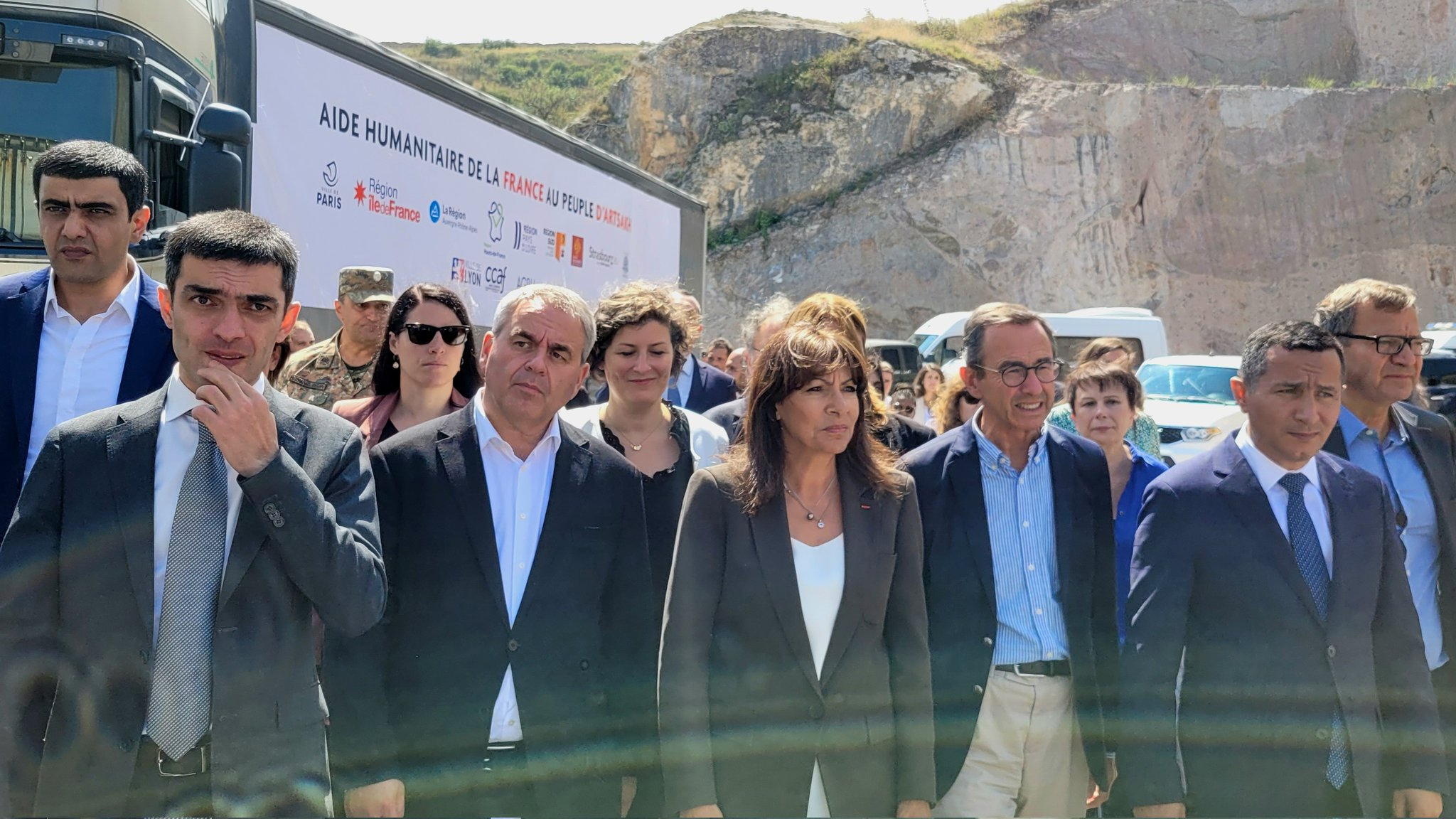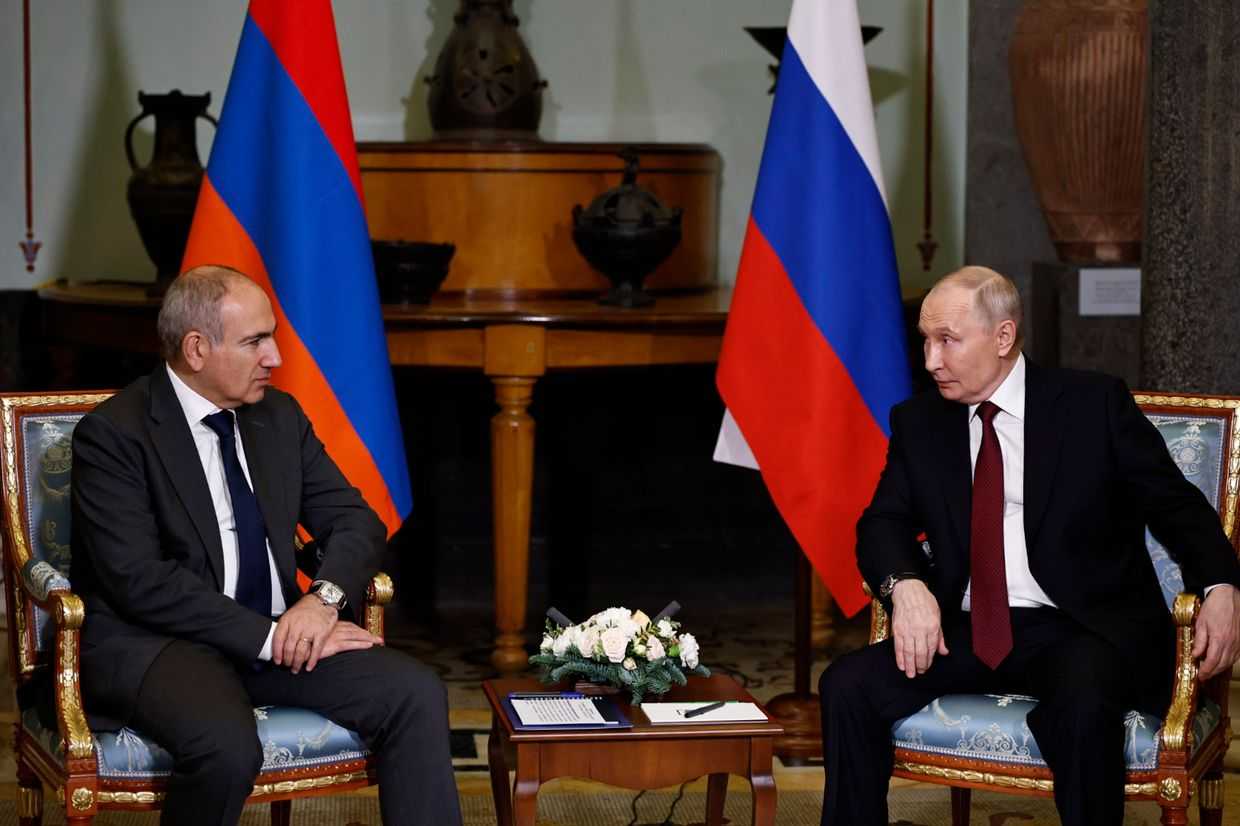
Azerbaijan has blocked access to a French humanitarian convoy attempting to reach Nagorno-Karabakh for the second time in less than a month, as Baku attempts to send a convoy of its own through Azerbaijani-controlled territory.
The convoy made up of ten lorries was sent by the Paris municipality and a number of humanitarian organisations on Wednesday morning. It set off from Yerevan to Kornidzor, joining other convoys at the Azerbaijani checkpoint on the Lachin Corridor previously sent by Armenia and France in late July and early August.
The convoy was accompanied by the Mayor of Paris Anne Hidalgo, who tweeted out at the Azerbaijani checkpoint on the Lachin Corridor — the only road connecting Nagorno-Karabakh to Armenia — that they had been barred entry.

‘Here at the Lachin Corridor, we testify that no humanitarian aid can enter Artsakh [Nagorno-Karabakh] in total violation of human rights’, wrote Hidalgo. ‘Our 10 humanitarian aid lorries were blocked.’
‘A humanitarian crisis is underway, it is urgent’, she added.
France has supported Armenia and its efforts to lift Baku’s blockade of Nagorno-Karabakh and the Lachin Corridor.
On Tuesday, French Foreign Minister Catherine Colonna called the blockade ‘immoral’, and stated that it aims to ‘provoke a mass exodus of Armenians from Nagorno-Karabakh’.
Also on Tuesday, French President Emmanuel Macron and his Azerbaijani counterpart Ilham Aliyev held a phone conversation, in which Aliyev accused Yerevan and Stepanakert of ‘creating artificial obstacles’ to prevent Nagorno-Karabakh’s access to humanitarian aid.
He criticised them for not agreeing to receive Azerbaijani aid through Aghdam and said that the Lachin Corridor would only be opened after Armenia and Nagorno-Karabakh agree to the opening of the Aghdam–Stepanakert road.
Both Armenia and Nagorno-Karabakh reject Azerbaijani proposals to send humanitarian aid through Azerbaijani-controlled territory.
While some Western countries and the EU have welcomed Azerbaijan’s offer, EU High Commissioner Josep Borrell has made clear that the Aghdam–Stepanakert road cannot be an ‘alternative’ to the Lachin Corridor.
Nagorno-Karabakh has been under varying degrees of blockade since December and has been completely cut off from supplies from Armenia since mid-June.
Azerbaijan continues to deny that the region is under blockade as the humanitarian situation in Nagorno-Karabakh worsens.
Forty tonnes of Azerbaijani aid
On Tuesday, Baku announced that it was sending 40 tonnes of humanitarian aid to Nagorno-Karabakh through Aghdam with the mediation of the Azerbaijani Red Crescent.
The Azerbaijani convoy reached the Russian peacekeepers’ checkpoint on the line of contact outside of Askeran (Asgaran) later that day. On Wednesday afternoon, Azerbaijani media stated that the convoy was waiting for the peacekeeping mission to facilitate the passage of the goods to Nagorno-Karabakh.
Armenians residing in Askeran gathered to protest the arrival of the Azerbaijani convoy. Both the Azerbaijani Red Crescent and the Armenian protesters have erected tents on either side of the line of contact.
Azerbaijani media reported that Russian peacekeepers stationed at the checkpoint had erected barriers to prevent the advancement of the Azerbaijani convoy.
Nagorno-Karabakh has also rejected Azerbaijan’s offer of humanitarian aid, with its parliamentary speaker, Davit Ishkhanyan, stating that Stepanakert had decided to ‘keep that road closed’.
Earlier this week, Nagorno-Karabakh president Arayik Harutyunyan similarly stressed that Stepanakert would only accept humanitarian aid sent through the Lachin Corridor.
After the Azerbaijani convoy was sent, the Armenian Red Cross criticised the Azerbaijani Red Crescent for ‘violating the fundamental principles of the International Red Cross and Red Crescent Movement’.
‘Presently, Azerbaijan […] using the Azerbaijan Red Crescent Society is trying to obstruct the activity of the ICRC as the only humanitarian international organisation operating in Nagorno-Karabakh’, stated the organisation.
For ease of reading, we choose not to use qualifiers such as ‘de facto’, ‘unrecognised’, or ‘partially recognised’ when discussing institutions or political positions within Abkhazia, Nagorno-Karabakh, and South Ossetia. This does not imply a position on their status.








